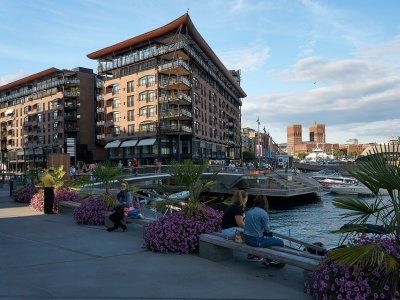
OSLO’S OUTLIER
Is there a case for dramatizing real-life terrorism?
It was an old mantra of the UK government not to give the oxygen of publicity to known terrorists, but the media landscape has altered so much that this dictum hardly applies now. The atrocities of 9/11 have been viewed hundreds of millions of times online; in most cases, presumably, by people who were horrified by them. Social media provides a planet’s worth of oxygen to terrorists.
But should movies be made of actual incidents of terrorism? British director Paul Greengrass has latterly been responsible for two. Flight 93 dramatises the fight-back by passengers on one plane on 9/11 which ensured it didn’t reach its intended target. Captain Philips deal with the hijacking of a containership by Somali pirates in 2009. Both are deeply sympathetic to the victims of the attacks and reveal extraordinary acts of heroism. Greengrass’ commitment to involve victims and relatives in the creation of each film went a long way to satisfying criticism that true-life terror should not be served up in a way that looks anything like entertainment.
To this canon he has added July 22 (Netflix). In some ways, this is the hardest film of the three to present in a way which honours the victims. In 2011, Anders Brevik murdered seventy-seven people in two separate incidents on the same day, bombing a government building in Oslo and shooting young people on a political summer camp. Speaking to Empire magazine (November 2018), Greengrass said he found its survivors more amenable to his project that might be expected:
They’re determined to find meaning. Why did this man do this? What does it mean that these ideas are out in the world? Far from being squeamish, their feelings are: ‘we have to confront this’.
The resulting film feels less cinematic than Flight 93 and Captain Philips and more like a documentary. The incidents themselves allowed less space for explicit, event-changing heroism, though acts of bravery must have occurred and the courage of those who are determined to re-build their lives is properly shown. If viewers can cope with the first thirty minutes of the drama (the whole film lasts nearly two further hours), they are faced with a story which has a compellingly familiar ring to it.
Is to commit such acts of barbarity a sign of illness or wickedness? Brevik was lucid, coherent and chillingly assured in police interviews and subsequent court testimony, but received an initial diagnosis of paranoid schizophrenia which was altered to a narcissistic personality disorder. In many ways, he proved an outlier for the rise of a particular way of thinking. Since 2011, the mainstreaming of his far-right ideology has occurred.
The idea that Europe is committing cultural suicide and opening itself fatally to the spread of Islam and feminism is the default-setting of several nations still sitting within the European Union. The rhetoric about the conspiracy of political elites to defraud the people has landed others into office in distinguished democracies.
In confronting extremism, attention to language might seem the least of our worries, but it is in the power of words that arguments are won and lost. The Word was there in the beginning and all human speech should be filtered through Christ to determine its true value. The elites of which Brevik speaks are supposedly rootless, cosmopolitan types who have no adherence to national borders but rig the global economy to make their ilk rich. He means Jewish people, of course, just as Hitler did. Only now the far right is careful to name them only in code.
Brevik and other extremists, claim to speak for ‘the people’. Yet when we stop to pick this apart, we realise they are actually speaking for one cohort of people against another cohort which looks, sounds and thinks differently to them. Of concern to us should be the way talk of ‘the people’ has also been mainstreamed since Brevik. Electorates should be wary of such talk. We are all pretty much ‘ordinary people’, but we do not necessarily share the same aspirations. The democratic process is there to adjudicate between people with clashing interests and to enable shared progress. Anyone claiming to speak for the people is more than likely privileging one type of citizen over another.
One of the things the Norwegian families most feared was that their story would be forgotten. Those unaffected lose interest very quickly, as can the Church which purports to pray for them. Paul Greengrass may be criticised by some for his trilogy of movies on real-life terrorism, but in giving his time, offering his ear and lending his direction, he has done more than most to dignify its victims. Lest we forget. For extremism never sleeps.
POPULAR ARTICLES

Obama's Covert Wars
The use of drones is going to change warfare out of all recognition in the next decades.

Through A Glass Starkly
Images of traumatic incidents caught on mobile phone can be put to remarkable effect.

What Are British Values?
Is there a British identity and if so, what has shaped the values and institutions that form it?


